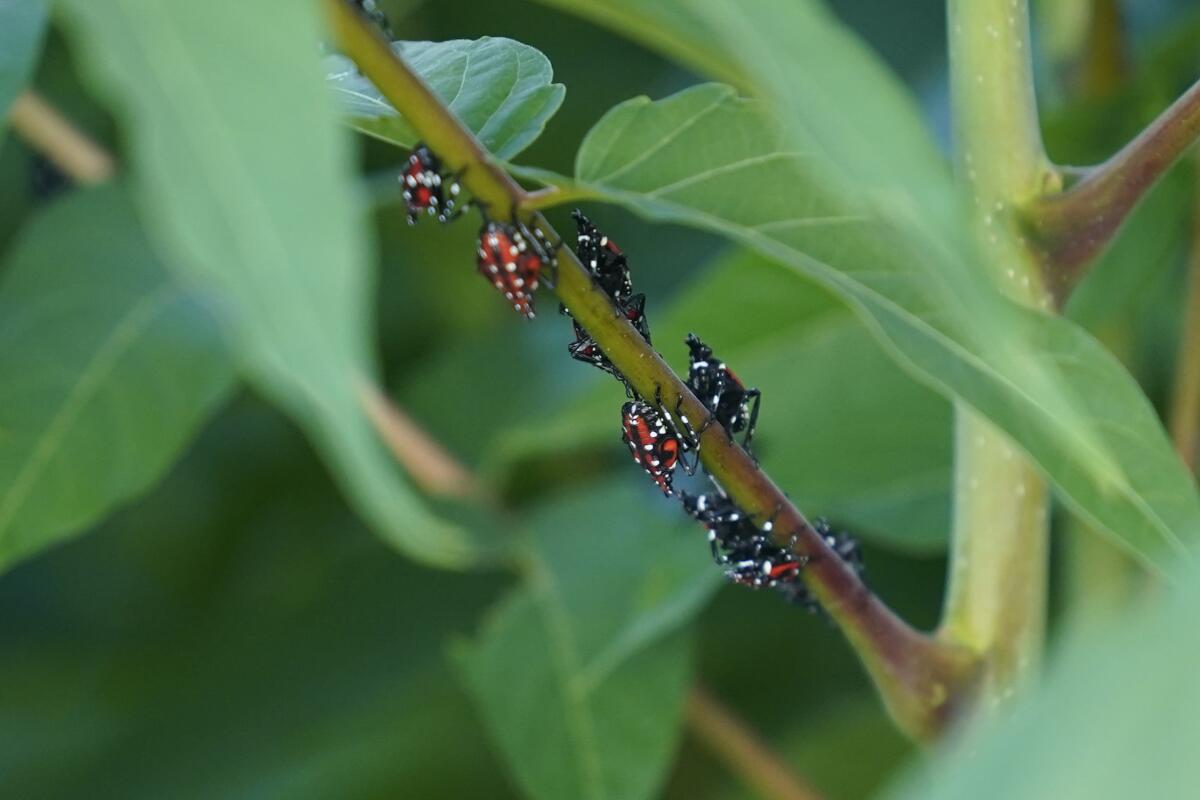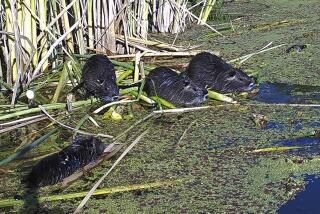Eggs of grapevine-gobbling insect snagged en route to California. Are vineyards at risk?

- Share via
Eggs of the spotted lanternfly, an invasive species that’s wreaked havoc on crops across more than a dozen states, were recently discovered on a metal art installation that was headed to Sonoma County, one of California’s most esteemed wine regions.
The discovery of the infamous bug’s eggs represents the first time the insect has been seen in California. The California Assn. of Winegrape Gowers, a statewide nonprofit, warns the invasive plant-hopper native to Asia has the potential to affect the entire winegrape industry in California, potentially pushing up prices if an infestation results in a smaller grape crop.
“Spotted lanternflies have been found in 18 states and have proven to pose a serious threat to vineyards,” Natalie Collins, president of the growers group, said. “These invasive insects feed on the sap of grapevines, while also leaving behind a sticky honeydew residue on the clusters and leaves.”
The goldspotted oak borer is just 14 miles from the Santa Monica Mountains’ 600,000 oak trees and threatens to devastate forests throughout California, harming wildlife and increasing fire risks.
Impacts of the stress on the plant could range from reduced yields — and fewer bottles of wine for consumers — and, if severe and persistent enough, complete vine death and higher wine prices. No adult spotted lanterflies have been reported in the state, Collins said.
California is responsible for an average of 81% of the total U.S. wine production each year, according to the Wine Institute.
The association warned that if there are additional egg masses in California from other shipments that haven’t been detected “they may produce adult [spotted lanternflies] in the coming weeks with peak populations expected in late summer or early fall.”
The California Department of Food and Agriculture last year developed an action plan to try to eradicate the pests if they were to enter the state. State officials have asked the public to look for egg masses outdoors. If a bug is found, they recommend grabbing it and placing it in a container where it can’t escape, snapping a photo and reporting it to the CDFA Pest Hotline at (800) 491-1899
The metal art installation on which the eggs were found was shipped to California in late March from New York, where the insects have been a persistent problem. After 11 viable egg masses were spotted at the Truckee Border Protection Station, the 30-foot-tall artwork was sent back to Nevada, where officials discovered an additional 30 egg masses. The art was power washed with detergent and then sent on its way again to Truckee, according to the association.
By the time the installation reached Sonoma County on April 4, the owner agreed to allow officials to open up the hollow beams in the artwork to inspect it further. Inside, they found an additional three egg masses and searched until they were confident no other eggs were present.
Spotted lanternflies were first discovered in Pennsylvania in 2014 and quickly spread to nearby states, where they became a nuisance. In New York they proved to be such a problem that officials encouraged residents to kill them on sight. The pest has become so notorious that it made an appearance on “Saturday Night Live” in a 2022 skit where one viewer applauded them for capturing “the unbelievable hubris of the lanternfly.”
Struggling California vineyards are having to compete with bargain-basement wine prices from overseas growers, due to global oversupply.
While they feed on more than 100 different plant species, they have a particular affinity for grapevines and a tree known as the “tree of heaven.” The adults, which have the ability to fly short distances, are typically 1 inch long. At rest, with its wings folded, the bug is a dull tan-gray color with black spots. During flight, its open wings feature a bright red, black and white pattern.
The species is often described as a “hitchhiker,” since its egg masses appear similar to cakes of mud and can easily be transported on tractor trailers and semi-trucks. During the first three immature stages of the bug’s life cycle they appear to be black with white spots and later turn red and black with white spots.
More to Read
Sign up for Essential California
The most important California stories and recommendations in your inbox every morning.
You may occasionally receive promotional content from the Los Angeles Times.













